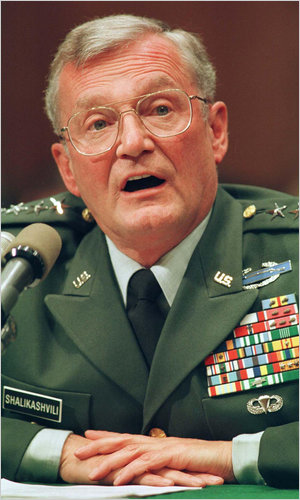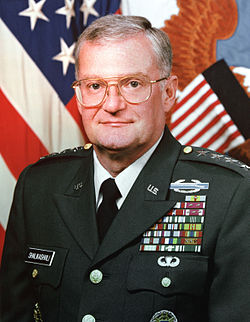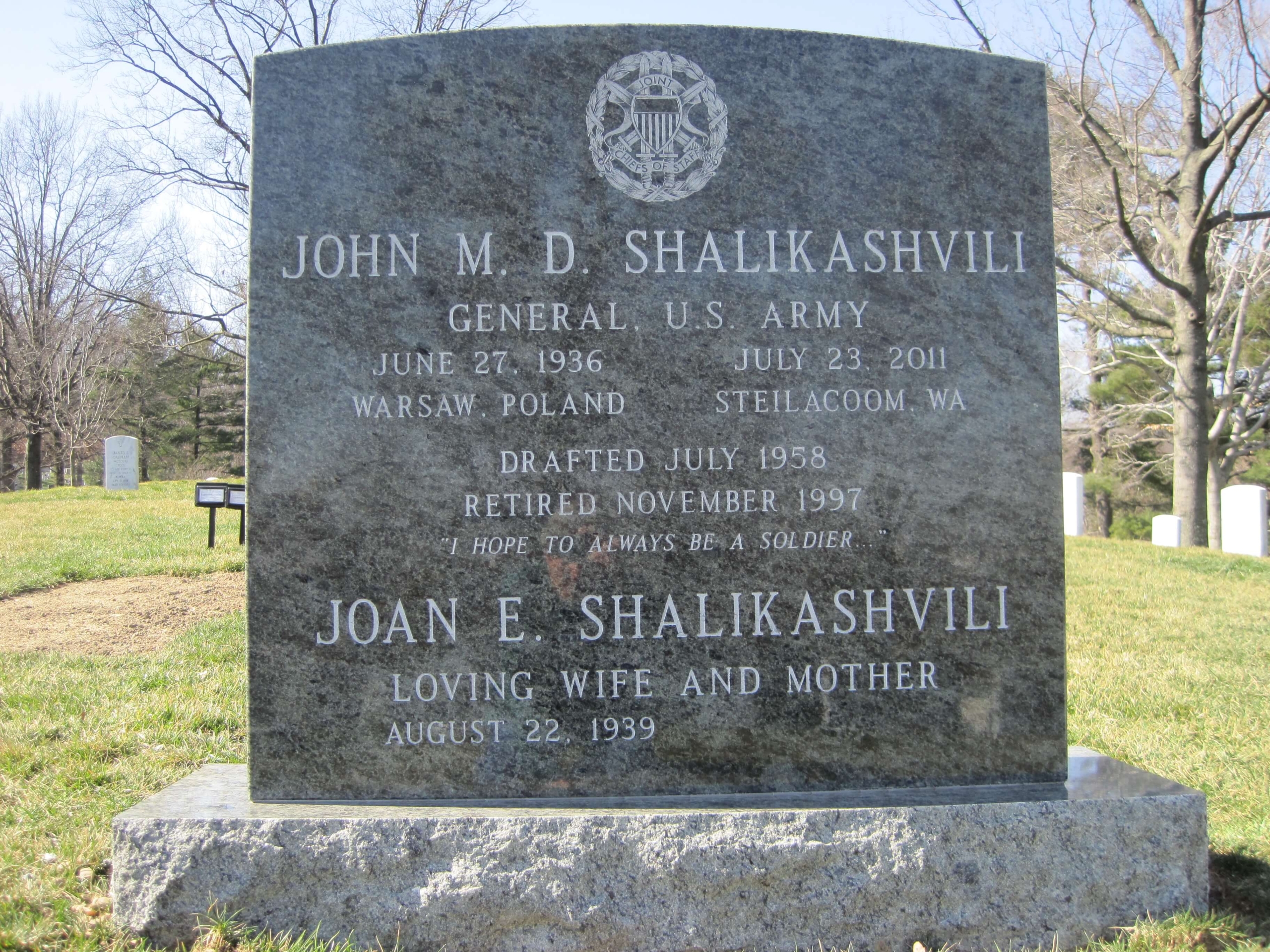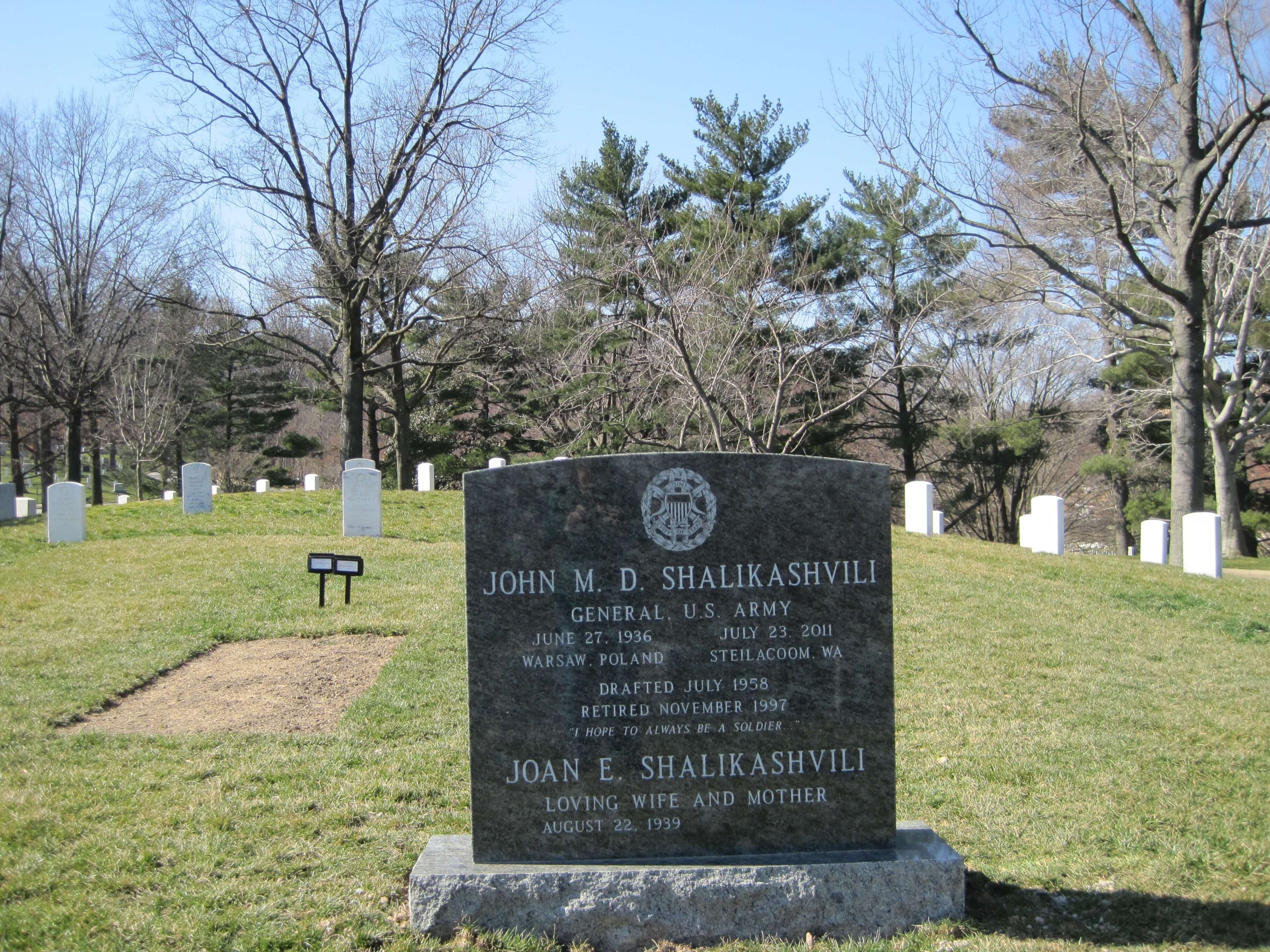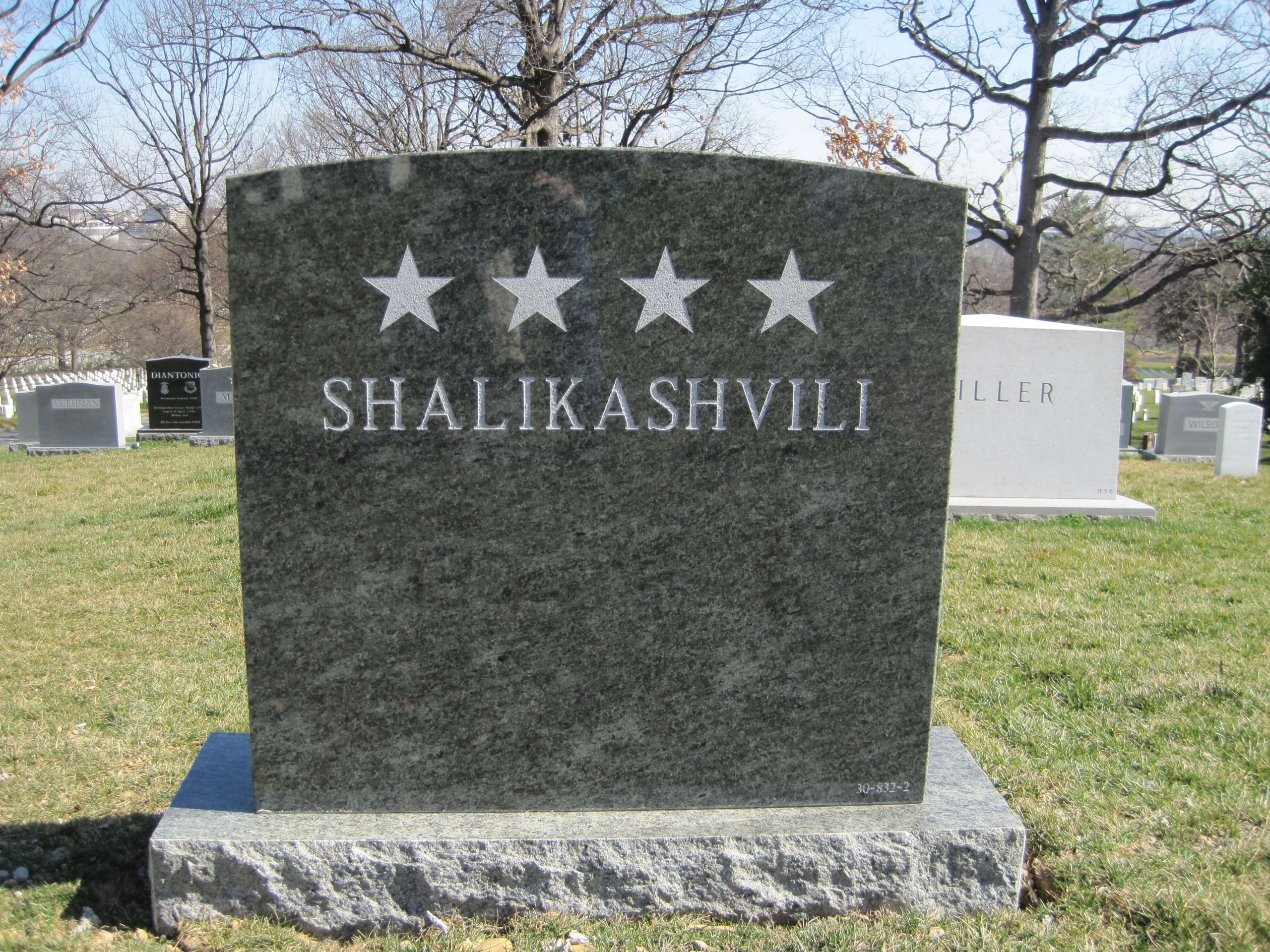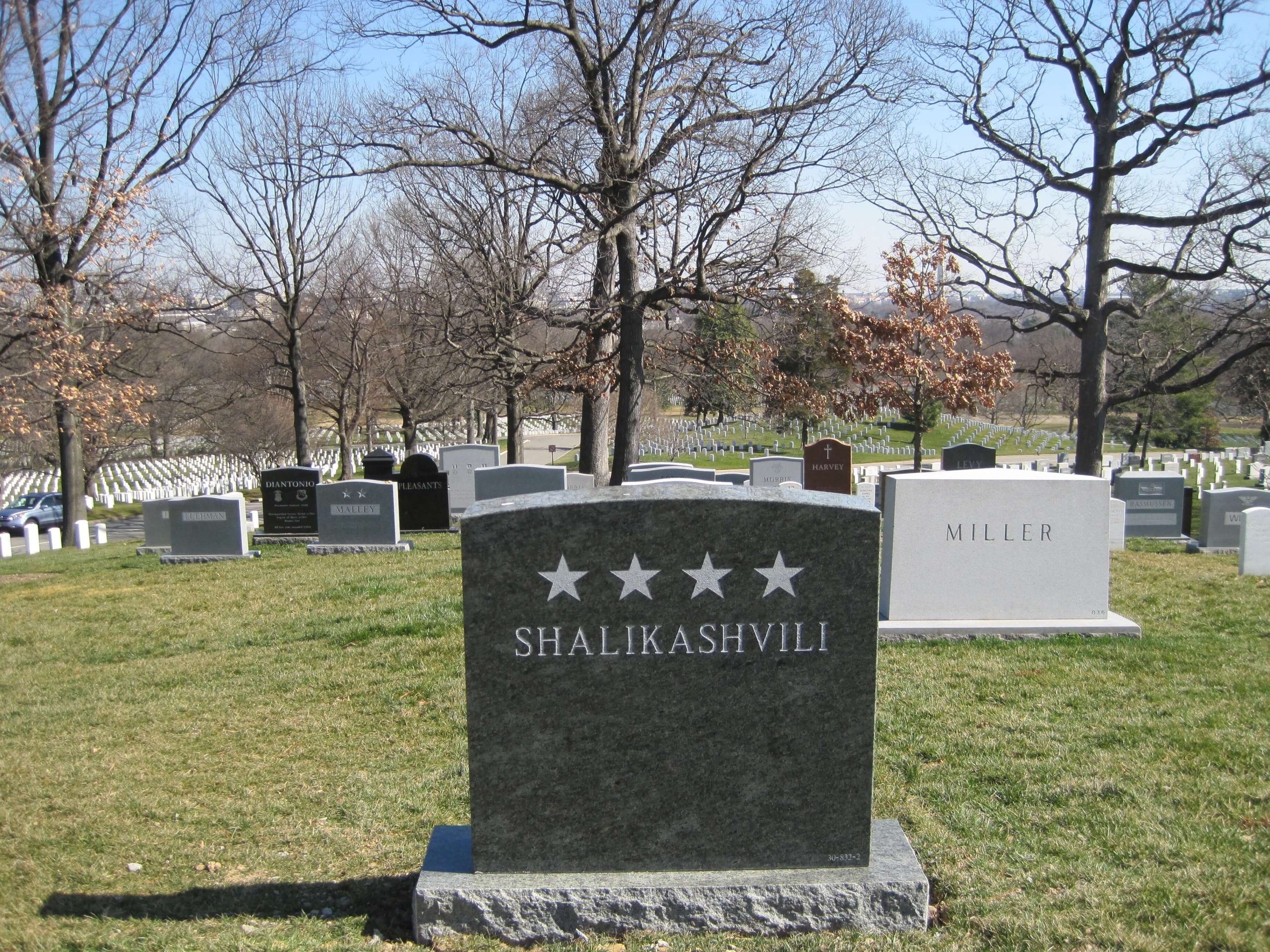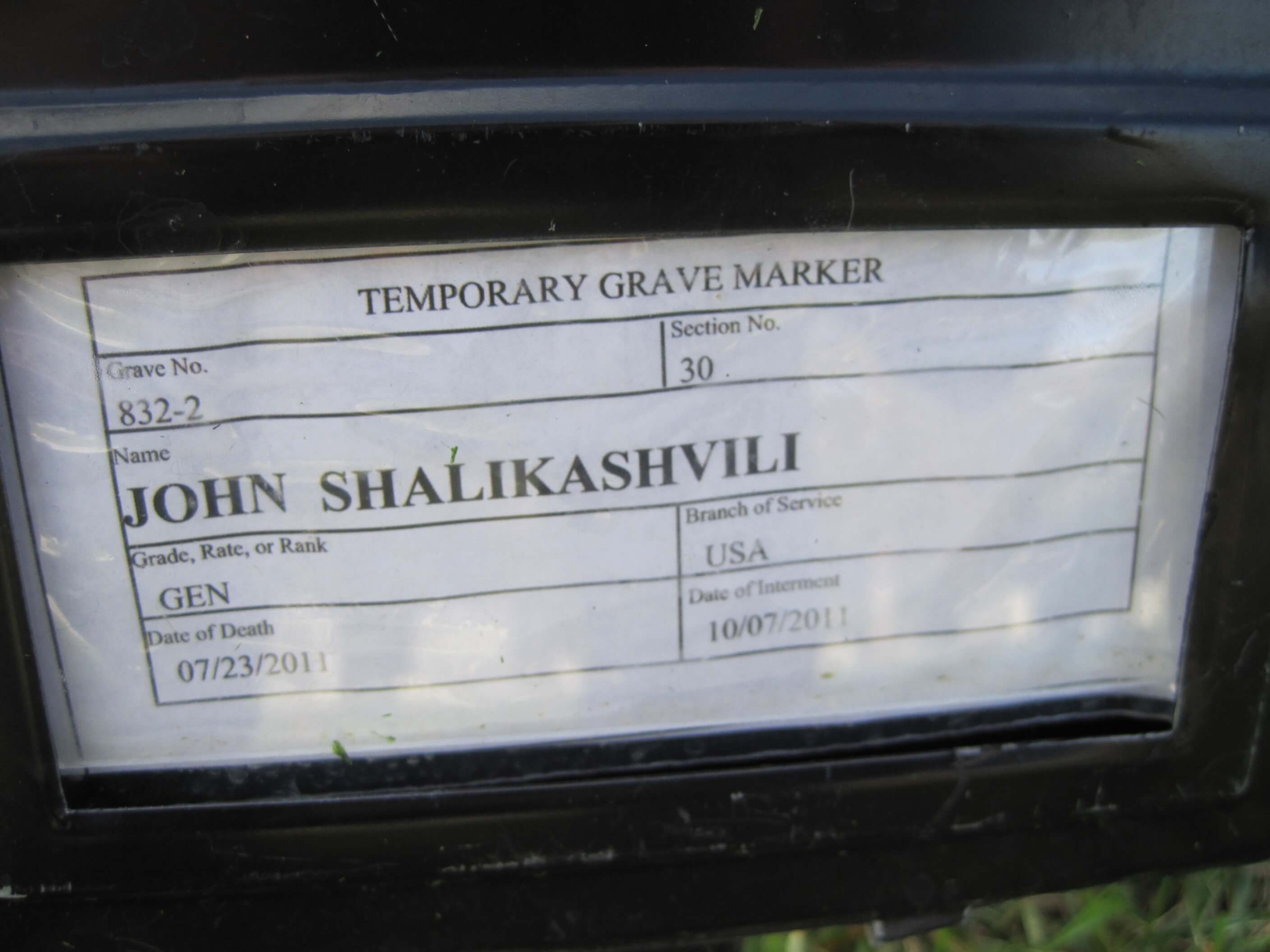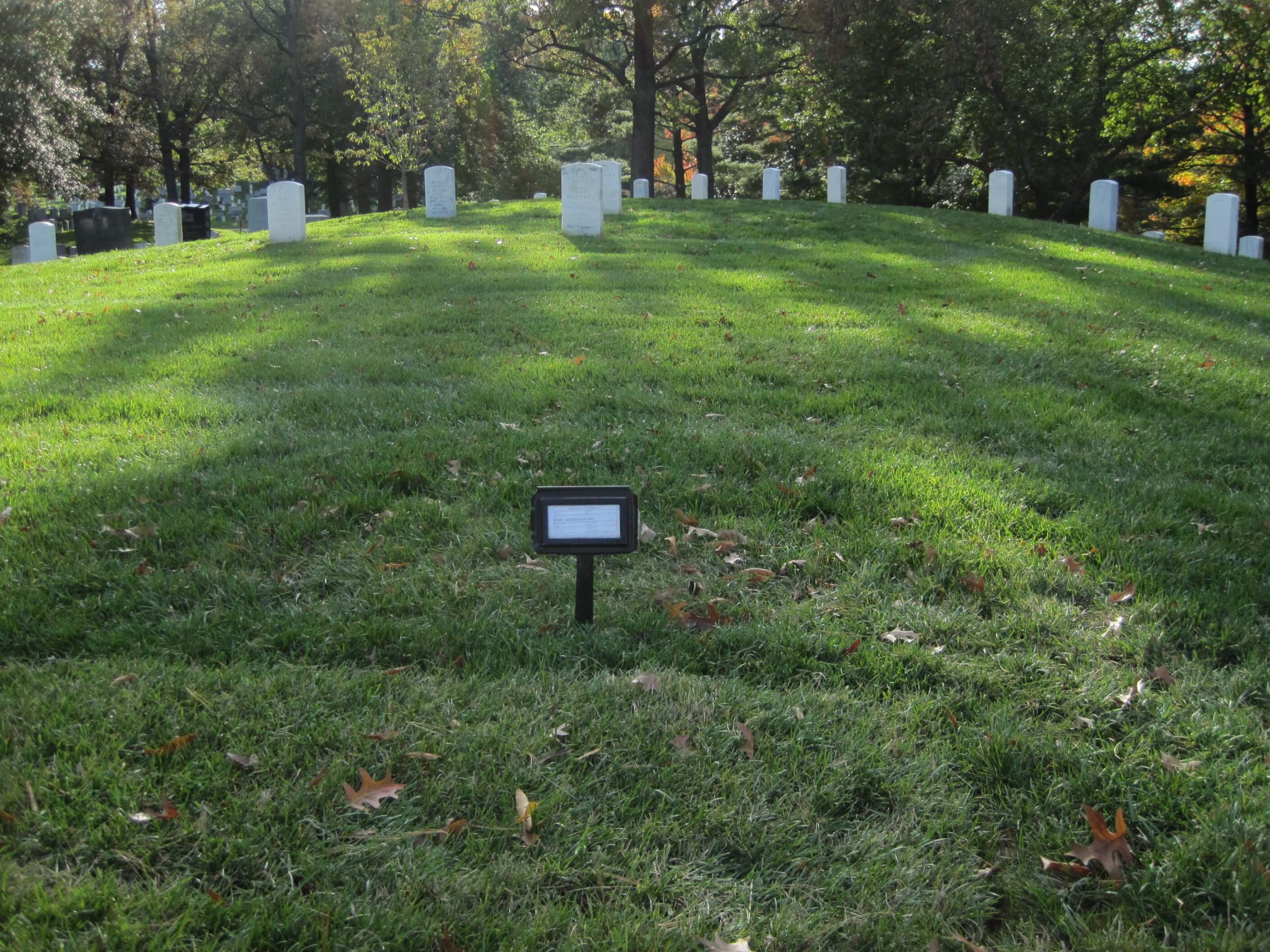23 July 2011:
Retired Army General John Shalikashvili, who rose from being an Army draftee to serving as chairman of the Joint Chiefs of Staff, has died of complications from a stroke, his executive assistant said Saturday. He was 75.
Shalikashvili died Saturday at Madigan Army Medical Center in Tacoma, Washington, according to assistant Rachel McLain.
An open memorial service will be held on August 6 at the Tacoma Convention Center. A funeral will be held at a later date at Arlington National Cemetery
General John M. Shalikashvili, Military Chief in 1990s, Dies at 75
23 June 2011
General John M. Shalikashvili, the first foreign-born soldier to become the chairman of the Joint Chiefs of Staff, died Saturday morning at an Army hospital in Washington State of complications after a stroke. He was 75.
General Shalikashvili succeeded General Colin L. Powell as chairman of the Joint Chiefs in 1993 under President Bill Clinton and served until 1997. He advised the President on crises in the Balkans, Haiti and other troubled places.
The General was born in Poland, and his family emigrated in 1952, when he was 16. He became a citizen in 1958 and was drafted two months later. He rose through the ranks, and at the end of the first Gulf War was put in charge of the United States military’s first major humanitarian mission, to return starving Kurds to Iraq.
Referring to the general by his nickname, President Obama said in a statement, “From his arrival in the United States as a 16-year-old Polish immigrant after the Second World War, to a young man who learned English from John Wayne movies, to his rise to the highest ranks of our military, Shali’s life was an ‘only-in-America’ story. By any measure, he made our country a safer and better place.”
(General Shalikashvili liked to say the story that he learned English watching westerns was only a slight exaggeration.)
When Mr. Clinton selected General Shalikashvili for chairman, the General had been sharply critical of the West’s delay in intervening in Bosnia.
“He never minced words, he never postured or pulled punches, he never shied away from tough issues or tough calls, and most important, he never shied away from doing what he believed was the right thing,” Mr. Clinton told The Associated Press on Saturday.
The General was the Chairman when the military’s so-called don’t ask, don’t tell policy toward gay and lesbian service members was adopted. He supported the policy at the time, but later changed his mind. In a 2007 opinion piece in The New York Times, he wrote that the policy had been “a useful speed bump that allowed temperatures to cool for a period of time while the culture continued to evolve.” But he said that conversations with soldiers had convinced him that gay men and lesbians serving openly “would not undermine the efficacy of the armed forces.”
Asked at the time of his confirmation how he felt about women in the military, he replied, “I feel great about women in the military.”
John Shalikashvili was born “stateless” on June 27, 1936. His parents were both refugees — his father, Dmitri Shalikashvili, was an aristocratic Georgian nationalist who fought the Soviets and emigrated to Poland, where he met his future wife, Maria, a refugee from St. Petersburg, Russia. In 1944, the family fled to Germany in a cattle car as the Soviet Army advanced. After the war, the family came to the United States and settled in Peoria, Illinois.
“I’ve never been a citizen of any other country except the United States,” the general said in an interview in 1995.
He received a degree in engineering and joined the Air Force Reserve Officers Training Corps, but his eyesight was too weak for him to fly a plane. Shortly after he became a citizen, he was drafted. He was stationed in Germany, Korea and Vietnam, and in the 1980s became a general known for his political and military finesse. In 1991 he became Assistant to the Chairman of the Joint Chiefs under General Powell.
“He has spent a lot of time getting his boots muddy,” one Army officer said at the time of General Shalikashvili’s appointment as Chairman. “He has more than a staff view of the world, but he also knows how Washington works and has a lot of credibility with the allies.”
In 1997, he retired. He worked as a visiting professor at Stanford’s Center for International Security and Cooperation and lived near Fort Lewis, Washington, where he was once Commanding General of the Ninth Infantry Division.
In 2004 he suffered a stroke that left him partly paralyzed. His death followed a second stroke, said Rachel McLain, his executive assistant.
He is survived by his wife, Joan, and son, Brant.
John M. Shalikashvili, 75, who as Chairman of the Joint Chiefs of Staff in the post-Cold War era of the 1990s extended the military’s mission beyond armed might to diplomatic and humanitarian concerns, died July 23 at an Army medical center in Tacoma, Wash. He had complications from a stroke.
The Polish-born General Shalikashvili, a four-star general in the Army, was the first immigrant to become chairman of the Joint Chiefs, the highest military council in the United States. He was appointed by President Bill Clinton in 1993 and succeeded Colin L. Powell as chairman.
At the time, the Soviet threat was receding, and the U.S. defense budget was decreasing. Inevitably, though, troubles broke out around the world, most notably in the Balkan states of the former Yugoslavia.
Before being named chairman of the Joint Chiefs, General Shalikashvili had commanded NATO and U.S. forces in Europe. He coordinated U.S. troop interventions in Bosnia, Haiti and Zaire (now known as Congo) in the 1990s but left his greatest mark by making the military a powerful force for humanitarian relief worldwide.
From 1992 to 1994, he oversaw an effort in which U.S. troops maintained security and distributed food to famine-stricken Somalia.
Mindful of his history of living through World War II in Poland, General Shalikashvili was particularly sensitive to the plight of people displaced by war and famine. In 1991, when he was NATO commander, he led Operation Provide Comfort, a large humanitarian effort in which 23,000 Allied troops provided aid to more than 500,000 Kurdish refugees fleeing the Iraqi regime of Saddam Hussein.
The job required sensitive diplomatic skills in dealing with Turkey, Iraq and Iran, but, above all, General Shalikashvili sought to return the Kurds to their homes.
He deliberately had the refugee camps built from flimsy materials so they would not survive the winter, which meant that the settlements would not become permanent. Most of the refugees returned to their original homes in northern Iraq within 90 days.
“That was the first time that I saw firsthand what an enormous capacity the armed forces have for doing good,” General Shalikashvili told writer Tad Szulc for Parade magazine in 1994. “If you make them permanent, they will be there — and we will have created another Gaza Strip. Today, there isn’t a single camp anywhere. That, to me, is probably as satisfying as that we returned them to their own towns and villages.”
John Malchase David Shalikashvili was born June 27, 1936, in Warsaw, where his family had settled after fleeing the Soviet Union.
His ancestors were from the onetime Soviet republic of Georgia, and his maternal grandfather had been a general in the army of the Russian czars. His grandmother had been an attendant to the royal court in St. Petersburg.
“As I was growing up,” he told New York Times magazine in 1995, “my mother told me vivid stories about court life in St. Petersburg, about Rasputin, and about the family’s flight from St. Petersburg after the Communists took over.”
During World War II, his father, a onetime member of the Polish cavalry, returned to Georgia, ended up fighting under German command and was taken prisoner by the British. Gen. Shalikashvili did not learn of his father’s collaboration with the Nazis until his confirmation hearings for Joint Chiefs chairman in 1993.
The future general spent most of the war in Warsaw with his mother and brother.
“I remember moving through sewers because you couldn’t get from one side of the street to the other,” he said 50 years later. “I remember being bombed in Warsaw and the building collapsing over us.”
He and his family were shipped by cattle car to Germany in 1944 and lived with wealthy relatives for several years before coming to the United States in 1952 and settling in Peoria, Illinois.
General Shalikashvili learned English from John Wayne movies, graduated from Bradley University in Peoria in 1958 and was drafted into the Army. He received a master’s degree in international affairs from George Washington University in 1970.
He retired from the Army in 1997 and had a severe stroke in 2004.
His first wife, Gunhild Bartsch, died in 1965. Survivors include his wife of 44 years, the former Joan Zimpelman of Steilacoom, Washington; and a son from his second marriage, Brant Shalikashvili of the District.
In recent years, Gen. Shalikashvili supported the repeal of the “don’t ask, don’t tell” policy banning gays from serving openly in the military.
Decorations and badges:
- Defense Distinguished Service Medal (with 3 Oak leaf clusters)
- Distinguished Service Medal, Army
- Legion of Merit (with 2 Oak Leaf Clusters)
- Bronze Star (with Valor device)
- Meritorious Service Medal (with 3 Oak Leaf Clusters)
- Air Medal
- Joint Service Commendation Medal
- Army Commendation Medal
- Presidential Medal of Freedom
- National Defense Service Medal with bronze service star in lieu of two campaigns
- Armed Forces Expeditionary Medal
- Vietnam Service Medal with silver service star in lieu of five campaigns
- Southwest Asia Service Medal
- Humanitarian Service Medal
- Army Service Ribbon
- Overseas Service Ribbon with numeral 5 device
- Inter-American Defense Board Medal
- Combat Infantryman Badge
- Parachutist Badge
- Office of the Joint Chiefs of Staff Identification Badge
- Army Staff Identification Badge
- Vietnam – Vietnam Gallantry Cross with two Silver Stars (Division citation) and one bronze star (Regiment citation)
- Vietnam – Vietnam Armed Forces Honor Medal (First Class)
- Vietnam – Vietnam Campaign Medal with 1960 bar
- Canada – Meritorious Service Decoration (Military Division), M.S.C. [4]
- Germany – Bund Naturschutz Medal [5]
- Poland – Grand Cross of the Order of Merit of the Republic of Poland[13]
- In 1996, he was the first recipient of the Naval War College Distinguished Graduate Leadership Award.
SHALIKASHVILI, JOHN
- GEN US ARMY
- DATE OF BIRTH: 06/27/1936
- DATE OF DEATH: 07/23/2011
- BURIED AT: SECTION 30 SITE 832-2
- ARLINGTON NATIONAL CEMETERY
Michael Robert Patterson was born in Arlington and is the son of a former officer of the US Army. So it was no wonder that sooner or later his interests drew him to American history and especially to American military history. Many of his articles can be found on renowned portals like the New York Times, Washingtonpost or Wikipedia.
Reviewed by: Michael Howard

